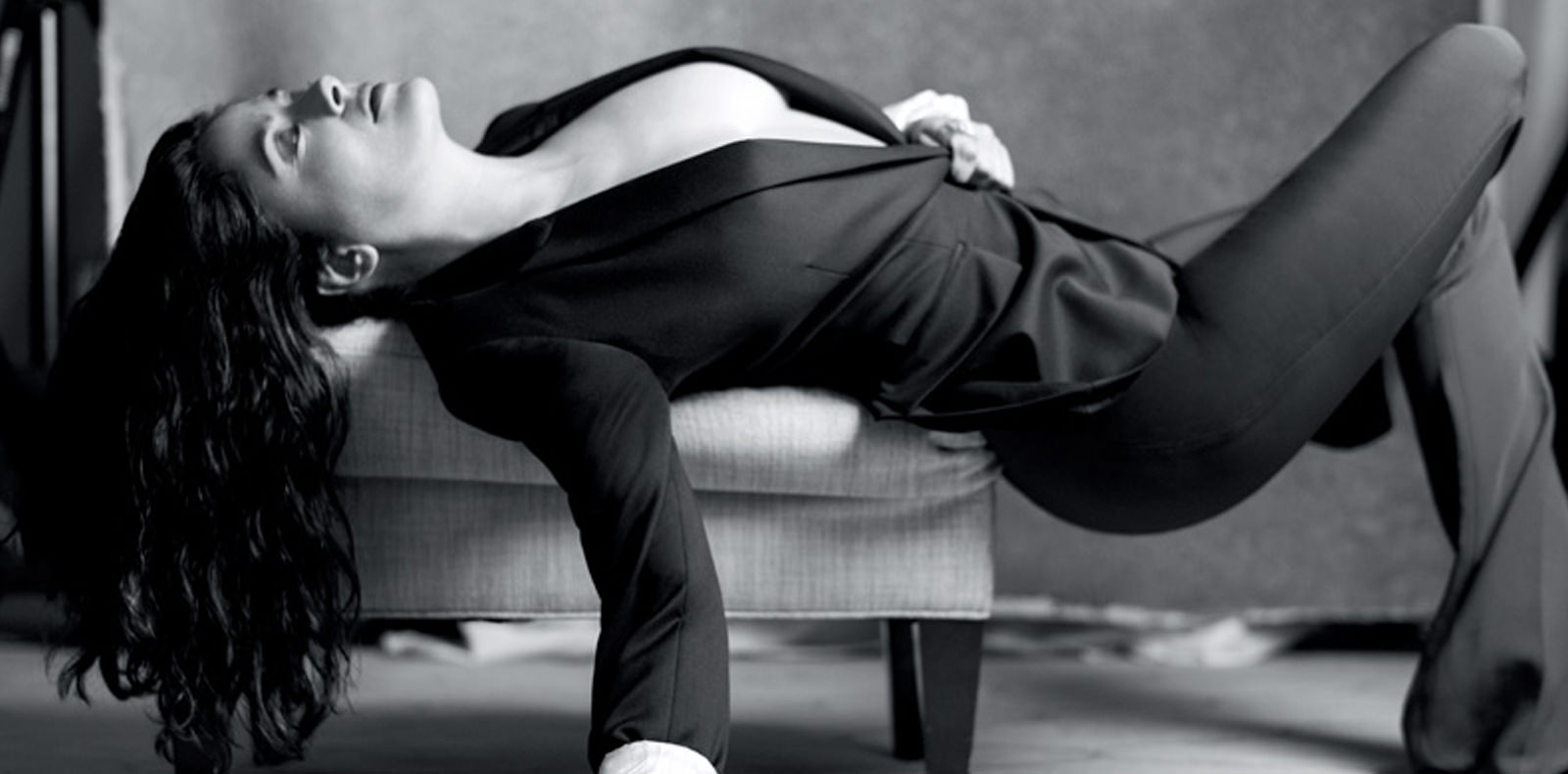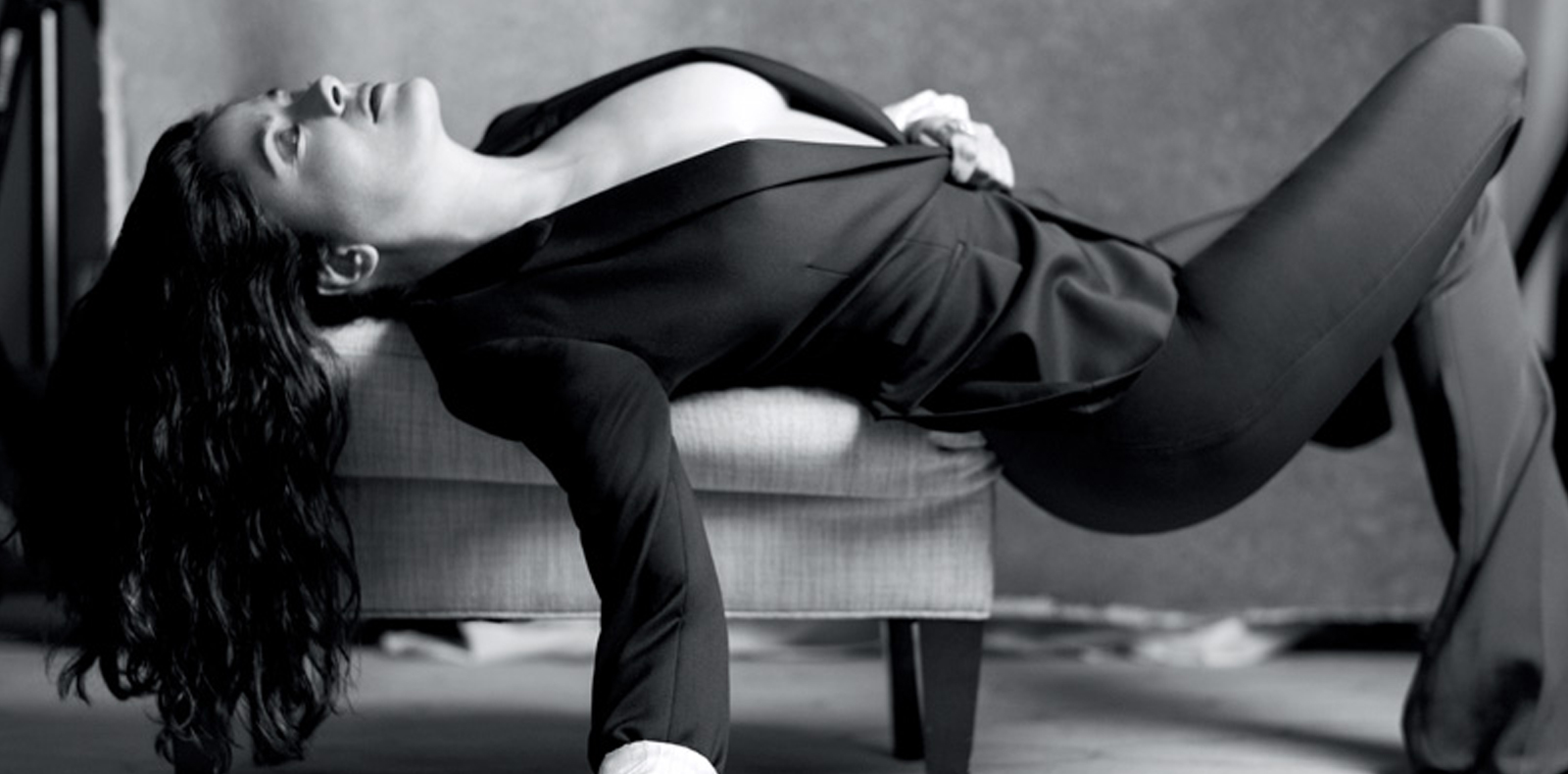
22

22
Interview with Salma Hayek, Mexican star fighting for women’s rights
No one has forgotten her mythic dance scene in Robert Rodriguez’s From Dusk Till Dawn, nor her astonishing portrayal of the artist Frida Kahlo in 2002. While pursuing her career as an actress, Salma Hayek is also fighting for women’s rights, in particular through the Kering Foundation’s Women in Motion initiative. Exclusively for Numéro, the sublime Mexican star (whose husband is François-Henri Pinault) describes the place of women today, and tells us all about the stereotypes that still persist at the highest levels of Hollywood.
By Philip Utz,
Photos Mathieu César.

Numéro: What is your involvement in the Kering Foundation’s Women in Motion initiative?
Salma Hayek:The Kering Foundation has been supporting the empowerment of women and fighting violence against women in different parts of the world for ten years now. The Kering Group is composed of more than 50% women, and ranks as one of the highest in the world in terms of executive positions given to women, including 64% on its board of directors. In 2015, when Kering became the sponsor of the Cannes Film Festival, one of the themes of the partnership was to share the group’s internal philosophy with the world of film. Because as you probably know, there’s a serious problem with women’s equality in the film industry. I’ve been fighting for women’s rights for 25 years now. Most of the work I’ve done in the past was fieldwork and strategy. I do very little awareness. When I first met my husband [Kering CEO François-Henri Pinault] and we started dating, I was in Guatemala and Nicaragua with the prostitutes, educating them on how to teach men to wear condoms.
What was it like working with prostitutes in Latin America?
We toured Latin America with YouthAIDS, an NGO that provides humanitarian assistance and raises awareness about the proliferation of HIV/AIDS. My specialty is women, so I would go to the prostíbulos [brothels], in the worst places you can imagine, and talk to the sex workers, train them, and give them the social responsibility to save lives through safe sex. The most interesting thing was that they could get any kind of man to wear a condom, except one: the policemen who raped them for free. This pattern was consistent in all the dif ferent countrie s. In Nicaragua, because of the initiative, the spread of AIDS fell dramatically. I can’t remember the exact percentage, but it was shocking. By the time we finished, they knew how to put condoms on without their johns even noticing. Actually, they taught me a couple of tricks! We would also lobby the governments for them to implement other measures to help women’s health: obviously I would work in the field with a specialist, but as far as the different governments were concerned, it made a huge difference for the specialist to be shouldered by somebody who was known worldwide. We can smoke here right?
Yes. At a press conference in Cannes earlier this year, Jessica Chastain said that she saw the “portrayal of women in films as disturbing.” What do you think she meant by that?
[Lighting a cigarette.] Women have less than 30% of the speaking roles in films. I’ll have to check the exact numbers again – I work on so many different projects that I sometimes lose track. But if I gave you the figures for female genital mutilation in Europe, for example, you’d totally freak out.
What’s female genital mutilation?
Certain groups chop women’s clitorises off because they think it makes them pure. It’s a barbaric practice that happens to hundreds of thousands of women in England and France alone. We work on this with the Kering Foundation, which is fantastic. The Foundation has also enabled us to train 500 Kering Group employees to detect domestic violence in the workplace, to help the victims out, support them, to get them out of abusive relationships or to work around the situation within the company. In Europe, one in three women is subject to domestic violence. One out of three. Which means that a lot of the women you know are victims of abuse. Many of them lose their jobs, because they can’t go to work for fear of showing the marks of violence. I feel sorry for you, because you thought you were going to get short answers to your questions… You didn’t know what you were getting yourself into!
Would you say Hollywood and the film industry are fundamentally sexist?
Yes.
How so?
What genre of film is Hollywood making for women?
Ummm… Romantic comedies?
Let me start right there: the fact that you’re suggesting that women are only interested in romantic comedies is sexist and condescending in itself. Hollywood doesn’t do programming for women. And yet women make 80% of the decisions on how money is spent in the household. We are avid consumers, and there’s a lot of money to be made out of that market. The younger generation of women is working, making decisions and going to the movies more than ever before. But until recently the studios hadn’t started researching what it is we actually want to see. They don’t care. They’re stuck in a completely outdated model. So what happened? We stayed at home and watched television, and now TV is killing their business. The younger generation of women found its voice through books, and what happened? The studios adapted Suzanne Collins’s best-seller, Hunger Games. They thought to themselves, “Wait a minute, there’s a market here!” And now they’re all desperately trying to gear their movies towards women. But the problem is that they forgot to develop the writers, the executives and the directors who would enable them to tap into the female market.
Is there really a “Hollywood pay gap”? Are women grossly underpaid compared to their male counterparts?
[Widening her eyes in disbelief.] How old are you, Philip?
42.
Okay, I’m going to give you a reference you might remember. Many years ago, there was a huge scandal because Demi Moore made $12 million for Striptease. Don’t ask me why, because the male leads were making $20 million per film at the time. And that’s just the salary. The perks for the big male stars were stratospheric: they would be given four huge trailers for the gym, the girlfriend, the family and the posse, and would be flown around the world on private jets. As a woman, you’d ask for a nanny for your kids and they would laugh you out of the house. And to be perfectly honest, things haven’t changed. It’s not just the actresses: women directors and executives don’t make the same money as their male counterparts, and they don’t get promoted as much. But, let’s face it, the sexism of the film industry is symptomatic of a much more widespread problem. In America, for god’s sake, we have politicians who say, “Why would a woman make as much money as a man?” It’s mind-blowing, but it’s been like that for so long that it has kind of become the norm.
“I have a philosophy of life: I don’t like to complain about anything that I haven’t done something to change. It’s very easy to complain, but if you haven’t made an effort to change it, then shut the fuck up.”
Is ageism also a problem for actresses?
Okay, let me give you another example so that you don’t think that I’m some cra z y feminist spouting nonsense. Let’s talk about the action stars. Sylvester Stallone, Bruce Willis and Arnold Schwarzenegger are still working and they’re all pushing 70. In Hollywood, the only actress who’s working consistently at that age is Meryl Streep. I mean, whatever happened to Meg Ryan? I’ll tell you what happened: she turned 38 and that was the end of her.
People often complain that there are no great parts for actresses over the age of 50, and yet you recently played one of your strongest roles in Miguel Arteta’s Beatriz at Dinner.
I am the exception to every rule. When I first started out, I remember them telling me, “Go back to Mexico! You’ll never work in Hollywood!” And yet I became the first Mexican to secure leading roles in Hollywood since Dolores del Río in 1930. She played in silent movies, so the accent was no doubt less of a problem. I was also the first Latina actress in the history of Hollywood to be nominated for best actress at the Academy Awards [for Frida, in 2003]. And then they told me, “You’ll be done by the time you’re 30!” And I’m now 50 and I’m working better than ever. [Raises her middle finger.]
Why did you decide to branch out from acting to producing in 1999?
I have a philosophy of life: I don’t like to complain about anything that I haven’t done something to change. It’s very easy to complain, but if you haven’t made an effort to change it, then shut the fuck up. And that’s exactly why I started the production company – to make the films that weren’t being made.
Have you ever been personally exposed to discrimination in your career?
How about the head of a studio telling you that you would have been the biggest star in the world had you not been born on the wrong side of the border? How about the same studio head telling you that you will never have a leading role – no matter how good an actress or how beautiful you are – because the minute you open your mouth, all his audience will be able to think about is their maid? How about a director who begged to put me in the leading role in a science-fiction movie, only to be told, “Nobody is ever going to believe that a Mexican made it to space”? How about Robert Rodriguez who wanted me for the lead in The Mask of Zorro, which he was supposed to be directing, telling me that I couldn’t say that I was Mexican if I wanted to get the part? Even though the character was Mexican. I took the meeting, and the first question was, “You’re not Mexican, right?” And I said, “Yes I am.” I didn’t get the part – even though Robert Rodriguez had written it for me – and there was such a blockage that he decided not to do the movie. Robert Rodriguez walked from Zorro. And for the Mexican role, they cast Catherine Zeta-Jones. Do you want me to continue, or have you had enough?
Speaking of the border, what do you make of President Trump’s plans for the wall?
It’s a joke, that’s what it is. It’s the stupidest idea I ever heard. I don’t even know why people waste their breath on it, because it will never happen. Never. It’s the stupidest thing anyone has ever said. It’s been a year now, and yet nobody can come up with a budget. I think I heard the figure of $17 billion being knocked around for the raw materials, but nobody can come up with a quote to build it. Added to which, you can’t build the wall without the Mexicans. There aren’t enough American people in construction near the border to build the wall. You would need to pay illegal workers to actually build it. Another problem that nobody ever seems to mention is what are you going to do with the rivers and the mountains? It’s impossible. Let’s say that they’re stupid enough to build a dam over every river, that they ruin the border’s ecosystem, break the economy of the United States and build it using illegal aliens… How is that going to solve the problem? If you think you’re going to stop the Mexicans from coming with a wall, then you’d better think twice. They’re going to go underneath, they’re going to go over, they’re going to go around it in the ocean… It’s the most ridiculous, absurd concept. Instead Trump should be giving us an intelligent plan of immigration reform. There are so many easy ways to fix it. Let me give you one example: Mexicans don’t want to go and live in the United States. For the most part, they leave to make the money to support their families back in Mexico. Or to run away from the drug business. Americans don’t want to do farming: they tried it in Arizona and it didn’t work out, they had an economic disaster. So the idea would be to give Mexicans work permits for them to come during the farming season, make their money, and return to Mexico. In that way they would pay their taxes and wouldn’t steal anyone’s jobs. The price of food in the United States would rise, for sure, because they would no longer be exploiting the millions of illegal immigrants who work for half the price with zero benefits. That’s why the government is in no rush to fix the problem – because it’s really good business for the United States.
How do you feel that President Trump’s narrative on immigration is affecting the way immigrants are perceived in the US?
It’s incredibly damaging. A lot of them have been subject to severe violence, and I think that it makes people feel entitled to be racist and to act upon it. When somebody attacked a black protester at one of the rallies during the campaign, Trump offered to pay for the attacker’s lawyer. So the president is actually encouraging violence. Personally I think he ought to be sued for defamation. When he was campaigning, he was involved in no less than 3,000 lawsuits for fraud, rape…
Rape?
Yes, everyone kept really quiet about the 13-year-old girl who was suing him for rape, and then all of a sudden he became the president and the whole case disappeared. Please look into it. And then he’s calling the Mexicans criminals and rapists…
Didn’t he try to seduce you once?
If he tried to seduce me I didn’t notice because it wouldn’t even have crossed my mind. But he did ask me out.
For dinner?
Many times. But I never accepted.
You never returned his calls?
I actually answered the phone, because he was calling my house. He befriended my boyfriend at an event and asked for the number. Then he started asking me out. There’s more, but let’s leave it at that.
What does being married to Mr. Pinault entail in terms of your ward robe? Gucci and Saint Laurent whenever you go out?
This is how it works… When I go out, it’s not like I have to wear my husband’s brands. If I do, it’s because the clothes are great!
If the ship’s sinking and you need to throw someone overboard to lighten the load, who do you toss off first? Stella McCartney, Anthony Vaccarello or Alessandro Michele?
Stella, because she’d be the first to make it ashore and start organizing the island to make it productive and self-sustainable. And she’d do it not only with a sense of style but also with a sense of humour.














